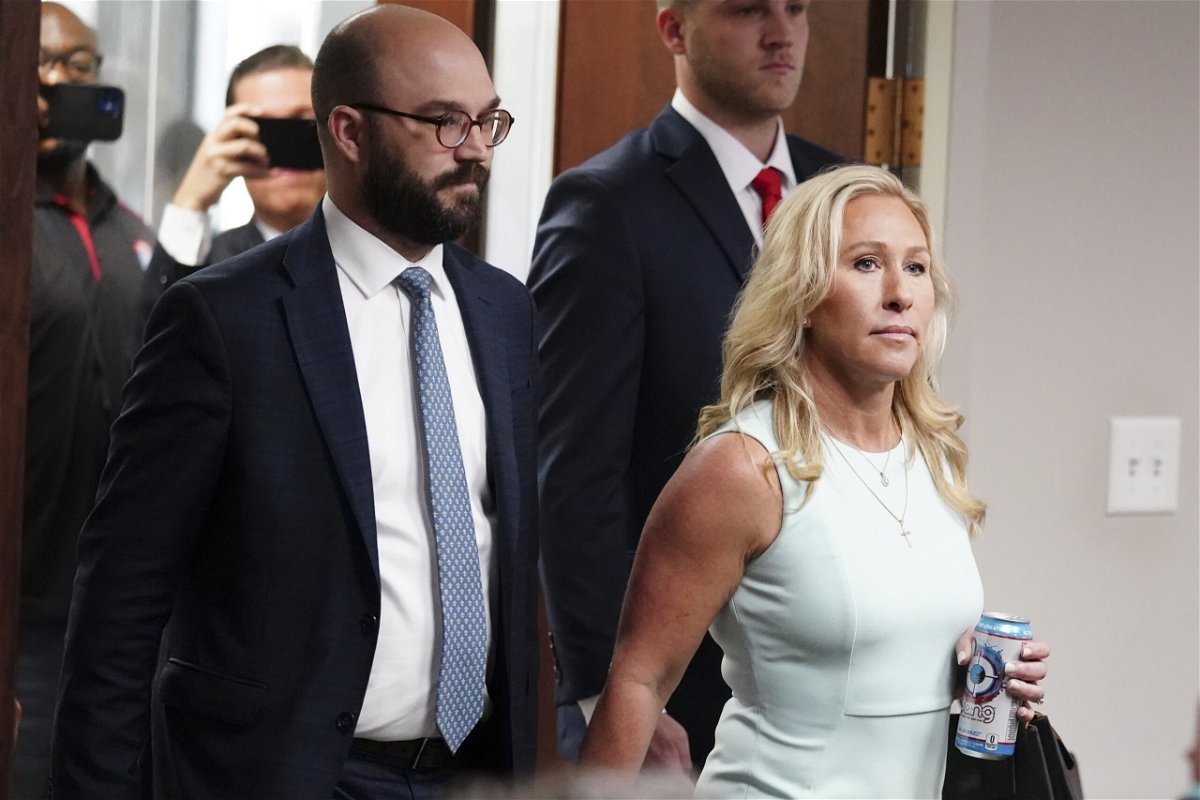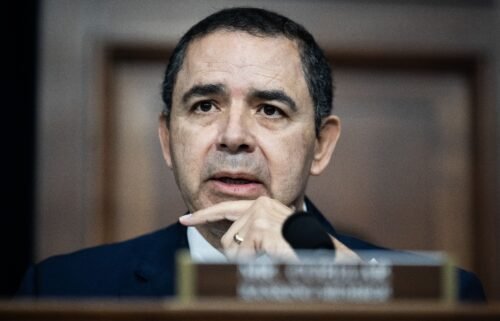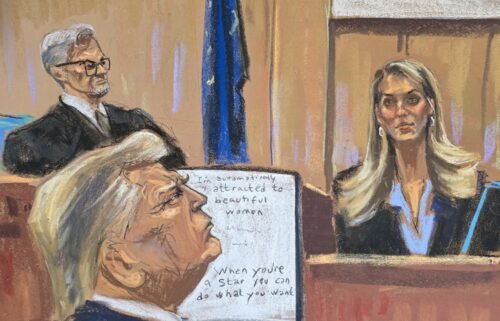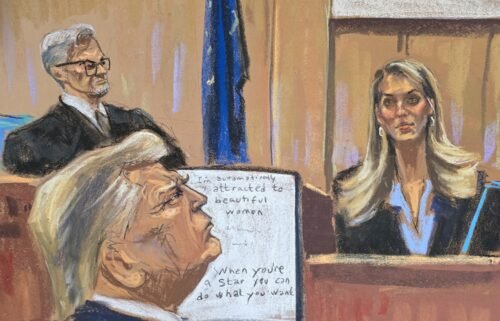Takeaways from Friday’s January 6-focused hearing on the bid to disqualify Marjorie Taylor Greene

Rep. Marjorie Taylor Greene enters the courtroom on Friday in Atlanta.
By Tierney Sneed, CNN
A hearing Friday on the longshot bid to remove Rep. Marjorie Taylor Greene from the ballot forced the far-right lawmaker to confront some of the incendiary rhetoric she’s used in the past, even as she denied vehemently that she encouraged the violent January 6 attack on the Capitol.
The activists challenging her congressional candidacy argued that her statements made her a participant of an insurrection, and thus, disqualify her from future government service. They tried to connect Greene to the plans to violently interrupt Congress’ electoral vote count and to those who orchestrated the attack. But Greene denied knowledge of any scheme to disrupt the proceedings and said she didn’t know key players who organized the rally that preceded the congressional breach.
Greene is one of multiple Republican lawmakers who have been targeted with disqualification petitions citing a constitutional amendment barring lawmakers from serving in office if they participated in an Insurrection. The challengers have faced an uphill battle to remove Greene and other lawmakers from the ballot, and on Friday, the judge presiding over the proceedings expressed some skepticism of their tactics.
But the hearing also subjected Greene to a detailed grilling about her views on the riot, and whether she had any knowledge of the plans to disrupt Congress’ counting of the electoral votes. She fiercely rebuked any suggestions that violence was what she had in mind as she called for protests and objections to Congress’ certification of President Joe Biden’s win.
Here are the takeaways from the hearing:
Greene repeatedly denied knowledge of or involvement in the violence of January 6
Greene said under oath that she had “no knowledge” of plans to disrupt Congress’ counting of the 2020 electoral votes.
She made the assertion after the challengers’ lawyer Andrew Celli asked whether — because of the oath of office she took as a member of Congress — she would have been obligated to stop or have arrested someone who was planning to interfere with the certification proceedings.
She repeated it again later on, telling the lawyer she “absolutely” did not have any prior knowledge of plans to disrupt the certification.
“I don’t know anything about that,” she said.
Asked about a Tweet on her now-suspended account promoting the plans for supporters of then-President Donald Trump to protest on Washington on the day of Congress’ certification vote, she said, “I was asking people to come for a peaceful march, which is what everyone is entitled to do under their First Amendment, but I was not asking them to actively engage in violence or any type of action.”
“All of my words never, ever mean anything for violence,” she added.
She later said she couldn’t recall whether she spoke to anyone in government about the protests planned for January 6. Nor could she remember anyone she spoke to about attending the January 6 demonstrations, according to her testimony.
Greene clung to conspiracy theories around the election and the Capitol breach
Claiming that there had been “tremendous amount” of voter fraud, Greene confirmed that she believed that President Joe Biden had lost the election to former President Donald Trump. Federal and state authorities have debunked claims of mass fraud, yet Greene claimed Friday there were “many instances” of fraud.
Greene said she believed that Biden had lost the election after she had repeatedly dodged questions about social media posts she published before January 6 pushing allegations of fraud and claims that Trump was the true victor of the 2020 election.
Earlier in the hearing her lawyer, James Bopp Jr., defended that the statements she made after the election as legitimate political speech.
“The question of voter fraud in the 2020 election was a, is a quintessential example of political speech, legitimate political disagreements about what happened,” Bopp said.
She clung to conspiracy theories about the Capitol assault and actively introduced some of the most sensational claims about that day.
When questioned by Celli, she said she did not know whether her FBI was behind the attack. She then name-checked a figure at the center of the fringe theories that the assault was an FBI false flag plot and said “there’s a lot of investigations that need to happen.”
She recalled, during the breach, thinking the attackers were “Antifa dressed up as Trump supporters” because “that was the first thing we were told.”
Asked whether anyone from Antifa or Black Lives Matter was arrested or charged for the Capitol assault, Greene said she didn’t know, while hinting at the false political prisoner narrative that the January 6 defendants are being unjustly jailed.
“I know they were arrested all over the country much through 2020 and over 95% of them had their charges dropped, unlike January 6 rioters that are still in jail,” she said.
Greene ran away from examples of incendiary rhetoric she has used in the past
Greene repeatedly was asked about statements and her posts on social media using incendiary rhetoric about Democratic lawmakers and other topics. She said she couldn’t recall a remarks she made, at a protest before she ran for Congress, asserting that House Speaker Nancy Pelosi had committed treason and that treason was “a crime punishable by death.” She said she did not know who liked from her account a Facebook post that referenced a “bullet to the head” of Pelosi, but she couldn’t saying definitively it wasn’t her.
“I am testifying: I have no idea who liked that comment.” she said, when asked to make clear it wasn’t her.
She said she didn’t recall calling for protestors to “flood” the Capitol as part of a 2019 demonstration in favor of funding a border wall, until the challengers played the video of her making the 2019 statement.
On several occasions, she rebuffed the challengers’ questions about her past statements by arguing videos of her had been clipped or had been taken out of context.
“That is me speaking but my sentences are cut off. My full message is not there,” she said about a video played of her talking about how “if they take away your guns,” one can never “stop a tyrannical government.”
She also said that, in a January 5 interview where she called January 6 a “1776 moment,” she was talking about “the courage to object” to the counting of the electoral votes.
The video was posted to her Facebook page, but Greene said she was not the one who posted it.
The challengers couldn’t tie Greene to specific violent actors
Faced with a blockade of “I don’t recalls,” challengers had little luck in getting Greene to elaborate her discussions or activity before the January 6 attack. Their lawyer also griped that, because of the quick timeline of the disqualification proceedings before the coming primaries, they weren’t allowed to obtain additional discovery. Their cases largely hung on the previous statements she had made that had been reported on by CNN and other outlets.
Left-wing advocacy groups –– who are working with local voters in Greene’s Georgia district — are seeking to remove Greene from the ballot as part of a larger campaign to use the Constitution’s 14th Amendment to hold accountable those lawmakers who allegedly boosted the violent disruption to Congress’ certification of the 2020 election. The 14th Amendment says any American official who takes an oath to uphold the Constitution is disqualified from holding any future office if they “engaged in insurrection or rebellion against the same, or given aid or comfort to the enemies thereof.”
Her testimony did not establish that she planned for violence or coordinated with anyone who rioted on January 6. That hole in the challengers’ case could significantly undermine their chances of disqualifying Greene, because they need to prove that she engaged in insurrection.
Georgia administrative law Judge Charles Beaudrot, who will ultimately give a recommendation to Secretary of State Brad Raffensperger on the disqualification question, didn’t weigh in on the substance of their arguments. But at times he knocked that tactics of the challengers’ lawyers.
Beaudrot sustained objections Friday lodged by Bopp to questions about Greene’s state of mind when she took her oath of office on January 3, 2021. He later said that the challengers they were “pushing the envelope” by focusing on remarks Greene made in 2019.
He was also frustrated with theatrics employed by both sides as they sparred over Bopps’ objections to the challengers’ questioning.
“This is not theater. This is not an argument in front of the Supreme Court. This is an evidentiary hearing,” Beaudrot said.
In Greene’s view, it was the challengers who were the threat to democracy
During opening statements, Greene’s lawyer said the effort risks “irrevocable harm to the voters and to the candidate” — particularly if Greene is removed from the ballot for the May primaries only for the disqualification to be reversed on appeal.
It’s a theme that Bopp, her lawyer, returned to during his closing, as he decried how the challengers supposedly wanted to “hijack and cancel words like 1776, the Declaration of Independence, Independence Day, and the American Revolution.”
He argued that the entire process was trampling over Greene’s constitutional rights, while claiming that the state proceedings were warping the purpose of the 14th Amendment. Bopp said the challengers have abused the candidacy challenge process, which usually revolves around residency and age limits, as he called Friday’s hearing a “political show trial.”
He warned that if “this line is breached — so that the political hyperbole of calling people insurrectionists turns into lawsuits brought by interest groups in order to abort our democracy, destroy the rights of voters to vote for candidates of their choice, and preclude individual members from running for reelection — our democracy your honor cannot survive that.”
This story and headline have been updated to reflect additional developments Friday.
The-CNN-Wire
™ & © 2022 Cable News Network, Inc., a WarnerMedia Company. All rights reserved.
CNN’s Marshall Cohen contributed reporting to this report.



